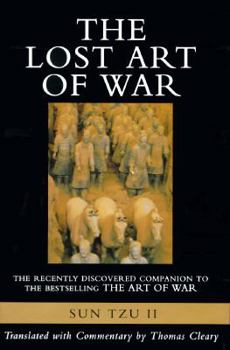The Lost Art of War
Select Format
Select Condition 
Book Overview
This is a translation of Sun Tzu's strategic manual of the complex principles and practices of organizations, tactical formation, strategic maneuvering and adaptation.
Format:Hardcover
Language:English
ISBN:0062513613
ISBN13:9780062513618
Release Date:January 1996
Publisher:HarperCollins Publishers
Length:154 Pages
Weight:0.69 lbs.
Dimensions:0.7" x 5.8" x 8.5"
Customer Reviews
3 ratings
The Other Sun Tzu
Published by Thriftbooks.com User , 18 years ago
Sun Wu wrote "The Art of War" with which so many people are familiar. His descendant, Sun Bin (the Sun family family name comes first) was also a military theorist, and wrote his own treatise. Sun Bin's text was lost for centuries; a fragmentary version was only recently discovered. This "Art of War" is a new classic - not a contradiction in terms. Even with Cleary's extensive commentary, it's a very short book. The advice is clear and applicable: "Be trustworthy as an ordinary matter of course," "Courtesy and harshness must be intermixed," "Experts at warfare see the strengths of opponents, and thereby know their weaknesses." Cleary's commentary pushes this into the modern corporate world, likening R & D to the elite advanced troops - well, analogies can be pushed too far. The specifics of military strategy are here, too, as well as the philosophical generalities. In particular, Sun Bin addresses the personal failings that make military losses inevitable. That includes commanders who are arrogant, impulsive, lax, vicious, or have other faults. Likewise, he addresses the right and wrong ways to use soldiers of different kinds, terrain and swamps, rivers, and subterfuge. Despite philosophical moments, its concrete style generally complements Sun Wu's tendency towards generalities. There's a lot here for students of Asian classics and for military theorists. It won't be the centerpiece of a collection, but it's a worthwhile addition to either kind. Whatever your interest, Cleary's modern and readable style makes the reading a pleasure. //wiredweird
Ian Myles Slater on: Excellent Edition, In Two Versions
Published by Thriftbooks.com User , 19 years ago
This 1996 volume in the Ballantine "Classics of Ancient China" series has been allowed to go out of print in its original format, although used copies seem to be readily available. There is a modified (but apparently not revised) 2003 edition under a different title from another publisher (see below). The Ballantine series was notable for offering texts re-edited or re-assessed on the basis of documentation recovered by archeologists in China during the 1970s, instead of the "received" texts handed down over centuries of copying, editing, and Imperial censorship, including some works otherwise lost. They combined up-to-date scholarship with an attractive presentation, popular appeal, and reasonable prices for bilingual volumes on rarefied topics. For those not familiar with this one already, "Sun Pin ping-fa" was long thought to be a bibliographic ghost, or even a lost forgery, a long-missing supposed counterpart to the existing "Art of War" (Ping-Fa) of the elder Sun (Sun-tzu; in Pinyin transliteration, Bingfa and Sunzi). It was one of the texts described in Han Dynasty bibliographies and histories, but not reliably reported as existing for well over a thousand years, although sometimes quoted in compendia. The conclusions that it probably hadn't existed, or wasn't authentic if there was such a work, and that the supposed citations were worthless, had to be abandoned when substantial fragments of it, and other texts, turned up in 1972, during the excavation of early Han Dynasty tombs. There have been several other translations of Sun Pin into English during the last decade, but the co-authors of this volume make a distinguished combination of an eminent senior Sinologist, with a long career working with the problems of early literary texts (Lau) and a sophisticated modern interpreter of Chinese intellectual history (Ames). Ames had earlier edited and translated an edition of Sun-tzu for the "Classics of Ancient China" series, which made use of archeologically-recovered ancient copies in addition to the received ("traditional") text, and re-assessed the place of "militarist" thinkers in early Chinese philosophy. As a result of this collaboration, the reader is assured of first-rate technical scholarship, and clearly-expressed explanations. Their emphases, not unexpectedly, are on textual and linguistic problems, and the place of the text in the development of Chinese military and political theory. The Ballantine Books production of the volume was outstanding. The Chinese text is presented in traditional vertical format, with as much or little space given it as necessary, and the English translation is presented beginning on a facing page. This leaves a lot of blank space, but it appears fully legible, and for the shorter chapters seems to be conveniently arranged for those able to read early Classical Chinese; the longer ones require flipping back a page or two to compare the original to the translation. A nice set of photographs includes th
I thought that this was a very good book.
Published by Thriftbooks.com User , 25 years ago
I liked it for its Strategic value, I didnt care much for the translators Comontery takeing up more of the book than what Sun Tsu wrote.But other than that I thought it was a very good book.






